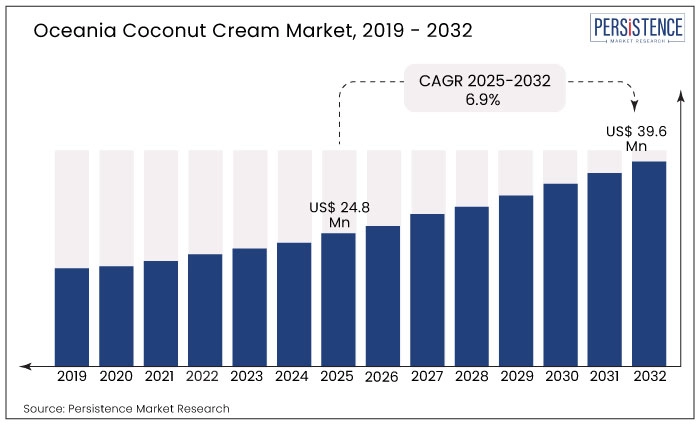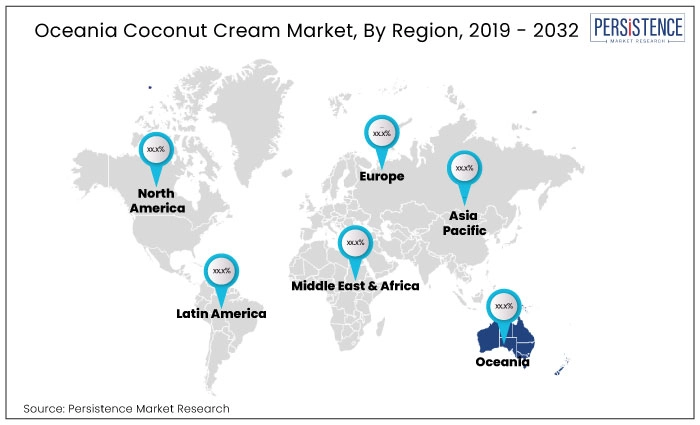ID: PMRREP33450| 139 Pages | 17 Jul 2025 | Format: PDF, Excel, PPT* | Food and Beverages

The Oceania coconut cream market expanded at 6.4% CAGR from 2019 to 2024 and ended up at a valuation of US$ 24.8 million in 2025. As per Persistence Market Research, sales of coconut cream in Oceania are projected to increase at 6.9% CAGR and reach US$ 39.6 million by the end of 2032.
Coconut cream is used as an essential ingredient in several industries, including foodservice, food & beverages, and retail/household. Key market dynamics such as rising health consciousness along with growing consumer shift toward dairy-free diets are positively influencing the growth of the market in the region.

| Report Attributes | Details |
|---|---|
|
Oceania Coconut Cream Market Size (2025E) |
US$ 24.8 Million |
|
Historical Market Growth Rate (2019 to 2024) |
4.8% CAGR |
|
Projected Market Value (2032F) |
US$ 39.6 Million |
|
Market Growth Rate (2025 to 2032) |
6.9% CAGR |
|
Market Share of Top 3 Manufacturers |
10% to 15% |
“Increasing Adoption of Veganism and Vegetarianism”
Vegan and vegetarian consumers depend on plant-based proteins and related products to complete their nutritional requirements. The desire for better health is a common motivating factor for people to adopt a vegan lifestyle, with plant-based sources providing optimal nutrition for these individuals. As nutrition remains a top priority for those seeking to improve their health through food, this trend is expected to contribute to the growth of the coconut cream market in Oceania.
In established markets, there is a growing interest in veganism, with more consumers opting for plant-based products. This trend is particularly evident in emerging markets in East and South Asia, where the number of consumers who exclusively consume plant-based products is on the rise. As the popularity of veganism continues to increase, it is expected to drive demand for coconut cream both domestically and internationally, due to its many benefits.
“Growing Demand for Transparency and Clean-Label Products”
Increasing consumer interest in clean and healthy eating has led to a greater demand for transparency about the sourcing of raw materials and processing methods used in food products. Manufacturers have responded to this demand by providing more information about their products, including indulgences.
Consumers are looking for food products that are free from artificial ingredients and preservatives, which has led to a growing demand for products with the "Clean-Label" certification. Clean labels provide consumers with concise and useful information about the products they purchase, allowing them to have greater control over their health and well-being while cutting through the excess data and confusion that can often accompany food labels.
“Manufacturers’ Increased Investments in Organic Food Marketing & Production”
Organic food products, once considered a luxury for a select few, are now accessible to a wider audience. Despite their higher price point due to factors such as limited supply and higher production costs, the health benefits of organic products are driving the Oceania market. Compared to non-organic or conventional foods, consumers perceive organic foods as more nutritious, environmentally friendly, and natural.
Consumers are becoming more conscious of the processing and environmental impact of brands. They understand that environmental issues have a direct impact on their well-being. Consumers who are aware of actions that contribute to environmental deterioration are increasingly choosing organic foods over conventional ones. This growing awareness has led to increased investment in organic food marketing and production, as brands seek to meet consumer demand for organic products that are both healthy and environmentally sustainable.
“Increasing Preference for Non-GMO & Allergen-free Products”
Consumers’ volatile preferences have been a key driver of changing market dynamics, particularly in the plant-based products segment, which is closely linked to health and wellness. This growing health consciousness among consumers has fueled the demand for natural and pure coconut cream. Countries like New Zealand and Australia have established high standards for biosecurity and biosafety, ensuring the import of high-quality raw materials, including coconuts, to the region.
Consumers worldwide are increasingly seeking out coconut cream that is free from genetically modified organisms (GMOs), soy, gluten, and dairy. The trend toward coconut cream that contains no preservatives, additives, or chemicals, and is conducive to good health, is expected to boost sales for coconut cream.
“Limited Production of Coconut Cream Compared to High Demand”
Organic products are trending, and thus, the demand for these products is increasing. Manufacturers and foodservice operators that use coconut cream in their products are looking for organic options as the use of organic products is on the rise.
Despite the significant demand for organic coconut cream, especially in Oceania, the production of such products remains limited, with only a few companies involved in their manufacturing. There is a scarcity of organic coconut cream products available in different flavors and varieties. Growing demand for such products is hindered due to the unavailability of organic options on store shelves.
What Makes Australia a Lucrative Market for Manufacturers of Coconut Cream?
“Consumers’ Increasing Inclination toward Natural Ingredients”
The Australian market is currently valued at US$ 13.43 million and is estimated to reach US$ 25.19 million by 2032.
Market growth is attributed to rising consumers’ inclination towards natural ingredient products, new product offerings from local as well as international players, and increasing visibility of coconut cream-based products across the country, while increased consumer spending on healthcare coupled with increasing awareness towards low caloric foods is driving the growth of this market in Australia.
Which Sector Extensively Utilizes Coconut Cream?
“Wide Utilization of Coconut Cream as Ingredient for Cosmetics and Food & Beverages”
Coconut cream is widely used in the cosmetics & personal care and food & beverages industries and the demand for coconut cream from these segments is expected to rise at a CAGR of 7.7% and 5.9% respectively, during the forecast period.
Which Nature-based Segment Accounts for High Demand?
“Increasing Focus of Manufacturers on Cultivation of Certified Organic Products”
The Oceania coconut cream market is categorized into organic and conventional. The organic segment is estimated to attain a valuation of US$ 11.43 million by the end of the forecast period.
The organic segment is projected to exhibit rapid growth based on consumers’ consumption trends. Manufacturers are also increasing their focus on the cultivation of certified organic products. Demand for additive-free products is a prominent driver for the growth of this segment.

Most companies engage in aggressive promotion of coconut-cream-based products to improve product positioning and visibility. Higher production and on-shelf availability of coconut-cream-based products are translating into a significant rise in coconut cream sales. Key players are further encouraged by the consolidated nature of the coconut cream industry and steadiness in the supply chain.
By Nature:
By End Use:
By Distribution Channel:
By Country:
The market is expected to reach US$ 24.8 million by 2025.
The market is projected to grow to US$ 39.6 million by 2032.
The market is anticipated to grow at a CAGR of 6.9% during the forecast period.
The increasing adoption of veganism and vegetarianism is a major factor driving market demand.
Major companies include COCO Shed Limited, Ceylon Kokonati, Davis Trading, Little Island Limited, and others.
| Attribute | Details |
|---|---|
|
Forecast Period |
2025 to 2032 |
|
Historical Data Available for |
2019 to 2024 |
|
Market Analysis |
US$ Million for Value |
|
Key Regions Covered |
South Asia & Pacific |
|
Key Countries Covered |
Australia and New Zealand |
|
Key Market Segments Covered |
|
|
Key Companies Profiled |
|
|
Report Coverage |
|
|
Customization & Pricing |
Available upon Request |
Delivery Timelines
For more information on this report and its delivery timelines please get in touch with our sales team.
About Author